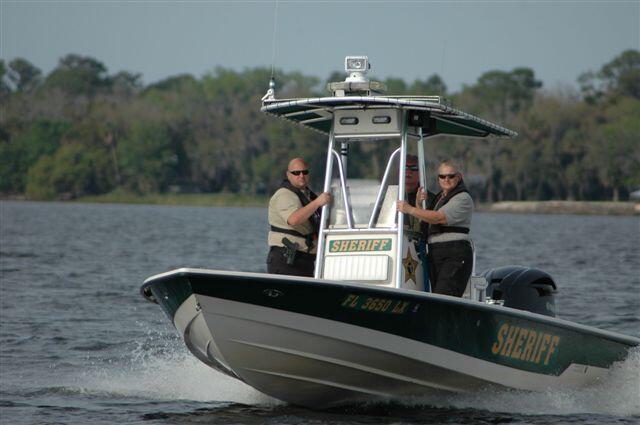
Georgia DNR Program Aims to Improve Ranger Safety, Customer Service
Published June 16th, 2014
At the time this was written, SmartCOP, Inc. was doing business as CTS America.
Source: Jacksonville.com Release Date: 4/13/2010
BRUNSWICK – Mark Carson routinely patrols Coastal Georgia’s isolated woods and waterways alone and far from the closest backup.
Until now, Carson and his fellow Georgia Department of Natural Resources law enforcement rangers have had no way to quickly determine whether they face a law-abiding sportsman or a violent criminal. Nor has there been a way for emergency personnel to know where to start looking should a ranger be injured or otherwise be unable to call for help.
Rangers are testing a computer-assisted communications and data system with a built-in GPS locator in a pilot program that ties the DNR into the Georgia State Patrol’s network, said Capt. Stephen Adams, who supervises the 25 rangers assigned to nine coastal counties.
Three DNR Game Management officers and two park rangers who face similar situations are in the pilot program, which began March 29.
They have been issued rugged, military-grade laptop computers that can be mounted in their patrol vehicles and boats. The system allows them 24-hour communications with state patrol dispatchers. It also gives them direct access from the field to the Georgia Crime Information System and the DNR license data base.
“The GPS lets them know where your boat or car is, so they have an area to start searching if something happens to you and you can’t radio or call for help,” Carson said.
Adams said “first and foremost, officer safety is the reason for this system.”
An accidental shooting nearly two years ago shows the need for such technology, Carson and Adams said.
“On Thanksgiving 2008, one of our officers was shot and had to use his personal cell phone to call for help,” Carson said.
DNR Cpl. Curtis Wright was investigating a report of illegal waterfowl hunting when he was struck in the chest by a rifle bullet fired by a deer hunter near Port Wentworth. The hunter administered emergency first-aid, then used his all-terrain vehicle to carry Wright out of the woods to meet emergency personnel.
“Nobody knew where he was … and that delayed help getting to him. This system would have gotten us a lot closer to his last known location so we could have gotten to him faster,” Adams said.
Wright recovered from the shooting. On any given day, however, rangers may encounter potentially deadly situations.
“A ranger frequently runs up on meth labs, convicted felons with firearms and people who are wanted … Until now, they’d be in the middle of nowhere dealing with an armed person and nobody would know where they were,” Adams said.
Rangers have department-issued radios, and many also carry personal cell phones. They’ve relied on county sheriffs for backup after 4:30 p.m. daily and on weekends when DNR offices are closed.
Until now, rangers haven’t been able to directly or immediately access the statewide crime data base from the field. GCIC allows officers to check individuals for outstanding warrants, and license tags to determine if a vehicle or boat has been reported stolen.
“With this system, we also will get BOLOs [law enforcement Be on the Look Out bulletins] directly, which is the first time that we’ve had that capability,” he said.
A similar system is used by the Florida Fish and Wildlife Conservation Commission and Florida Highway Patrol.
Adams said the system has already helped in one case. Recently in Richmond Hill, a ranger stopped a man to check his fishing license. He also checked GCIC, and discovered the man was wanted for arrest in Bryan County, Adams said.
It also will allow rangers to spend more time on patrol and less in the office doing administrative paperwork, Adams said.
“They can do their administrative duties while parked at the boat ramp, wildlife management area or side of the road,” he said.
Adams said the pilot program is being funded by a federal boating safety grant. Each laptop costs about $3,000 because it is built to withstand saltwater and other harsh conditions.
To keep expenses down, the DNR is piggy-backing on the state patrol’s computer network, sharing its server and using its software, Adams said.
Like troopers, rangers will be able to print out copies of licenses, reports or citations in the field, Carson said.
A ranger first class, Carson patrols Glynn and Camden counties as well as offshore sometimes as far as 25 miles out in the Atlantic Ocean when checking fishing vessels.
“This will be a big help to us when we’re dealing with our outdoor customers,” Carson said.
Sometimes, hunters and fishermen say they lost or left their license somewhere, he said.
“Now, we can run them through the computer to verify they had a valid license or boat registration, and print them out a copy on the spot to replace the one they lost,” Carson said.
Carson said he likes the system. The rangers’ comments and suggestions will be incorporated into a report due in June, which could determine whether the system will be expanded to all DNR rangers, Adams said.
[email protected],(912) 264-0405
